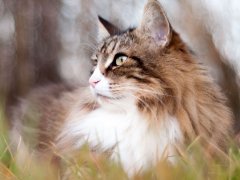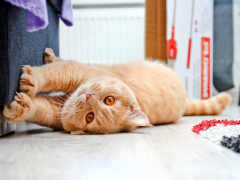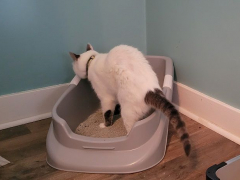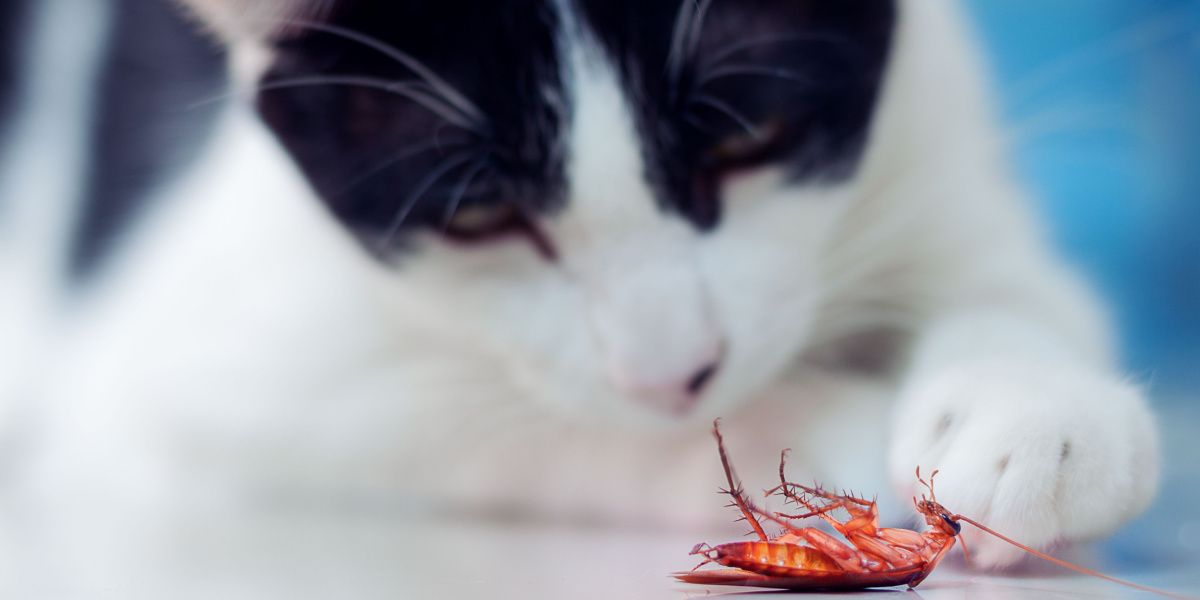
Finding the occasional roach in your house is unavoidable in many parts of the world, so even an indoor cat may encounter them. Although you probably find cockroaches repulsive due to their unsanitary habits, their scuttling movements often pique the interest of our feline companions.
Cats are attracted to catching and eating cockroaches as their sharp, quick, scuttling movements stimulate their natural hunting instincts. Insects form a small part of feral cats’ natural diets and can be a source of protein, fat and other nutrients. Eating roaches can be harmful to cats as they can carry bacteria, viruses, and parasites picked up as they crawl over decaying or rotten substances.Key Takeaways
Although some cats’ hunting instincts will be satisfied by stalking, catching, and playing with roaches, others will actually eat them. With global interest in alternative food sources increasing, cockroaches have been shown to be highly nutritious insects and are used as human and animal food, as well as being utilized in the pharmaceutical and beauty industries.
In the face of an infestation, you may be pleased if your cat is helping with pest control, but unfortunately eating cockroaches can cause health problems for our pets. In this article, we will discuss the reasons cats eat roaches, what the benefits could be, but also why it can cause health issues, and how to stop them from doing it.
Also Read: List of Foods Cats Can And Can Not Eat
Why Do Cats Eat Cockroaches?
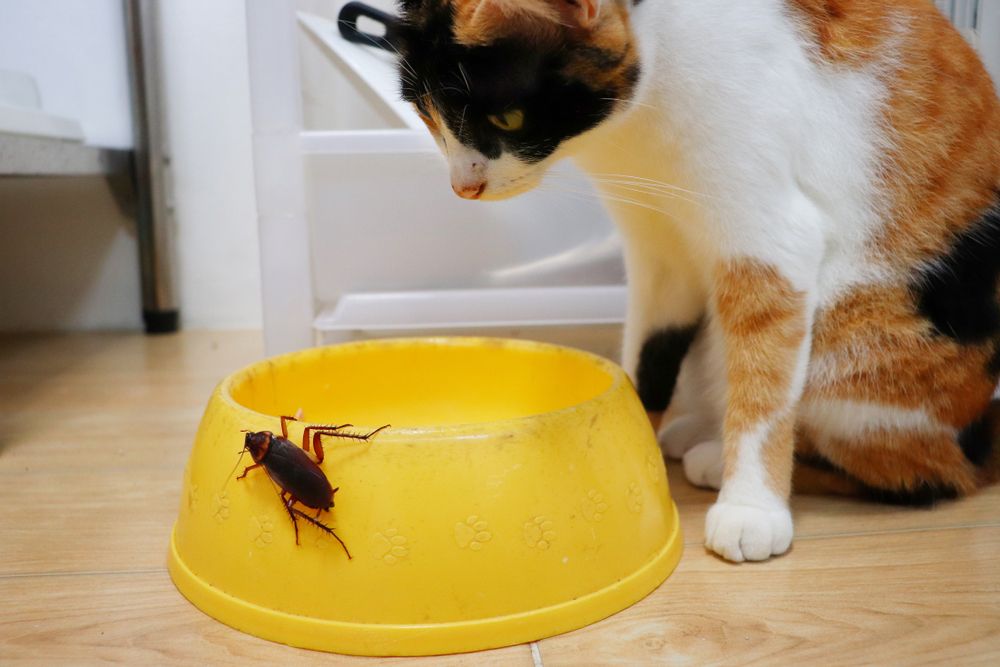
Modern-day domestic cats still share many similarities, both genetically and behaviorally, with their wild ancestors. DNA samples from pet cats around the world have been shown to be nearly identical to the African wildcat, and over 95% identical to that of tigers!
This means that despite providing our pet kitties with ample cat food, they still have very strong instincts to hunt and eat prey. Roaches’ relatively large size compared to other insects, and characteristic scuttling and skittering movements, make it hard for many cats to resist hunting and killing cockroaches.
The curious nature of younger cats makes them even more likely to have their interest sparked by seeing a roach, and they will often sniff, lick and bat them around, before progressing to trying them as a snack.
Cats are strict (obligate) carnivores and require animal tissue to meet their nutritional requirements. Unlike omnivores like dogs, cats are unable to synthesize certain amino acids (such as taurine), and vitamins themselves, and must eat them pre-formed in their diets.
Studies have shown that feral cats commonly consume invertebrates such as grasshoppers, crickets, and roaches as part of their diets along with small mammals, birds, reptiles, and amphibians – so catching and eating insects is a natural behavior.
Also Read: Why Do Cats Bring You Dead Animals?
Is There Any Nutritional Benefit To Eating Roaches?
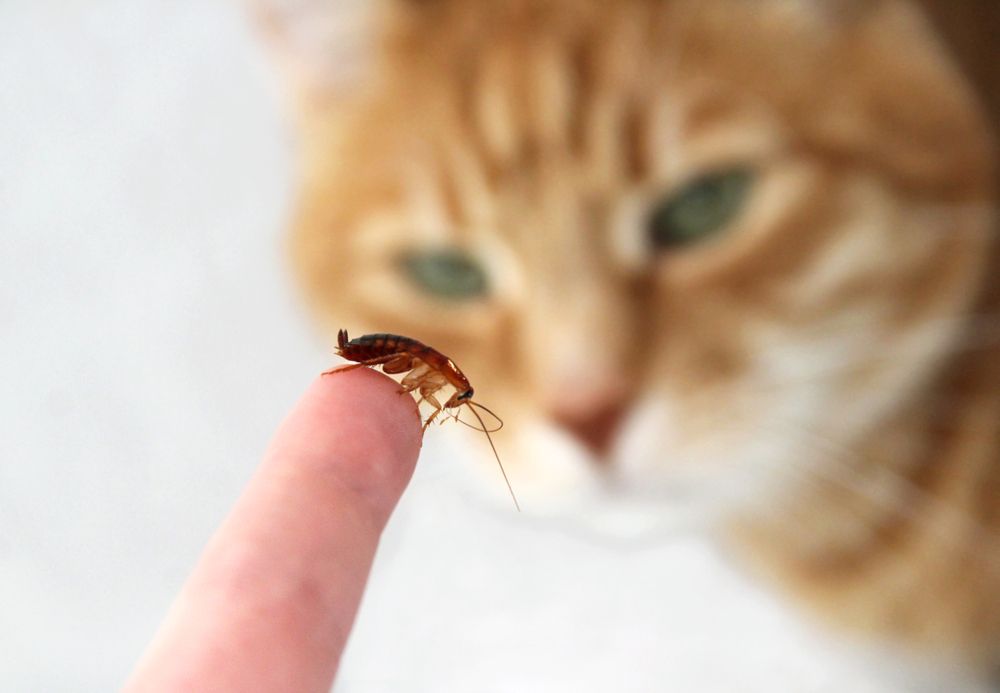
There are thousands of species of cockroaches and they are widely considered one of the most successful insects on earth. Only a few species of roaches are considered pests.
The largest species of common roach is the American cockroach (Periplaneta americana) which has attracted interest in the important search for alternative food and protein sources to help in the fight against climate change and meat shortages.
In some parts of the world, cockroaches are used for livestock and human food, as well as being utilized by the pharmaceutical and beauty industries, and in traditional Chinese medicine. A crystal-like milk derived from cockroaches is also being touted as a potential superfood!
So is there any nutritional benefit for cats when they eat roaches? A study into the value of American cockroaches as a food source for people and livestock concluded that they are highly nutritious insects, providing a good source of protein, fat, and various minerals.
There are also commercial diets for our pets that use insect proteins. Sounds great doesn’t it – so maybe your kitty should supplement their diet with the occasional roach. However, the nutrient value will be affected by factors such as the age and species of roach, and their food source (they’ll eat almost anything – from decaying vegetation to rotting food in the garbage can).
The insects in the study were also ground up, whereas when your cat catches and eats a roach its hard outer shell (exoskeleton) is hard to digest and so decreases the nutritional value.
Also Read: Why Do Cats Play With Their Prey?
Is It Dangerous for My Cat To Eat Roaches?
Although cockroaches may hold some nutritional benefits as a tasty snack for cats, unfortunately, they also pose several health risks to them:
- Although cockroaches are non-venomous, they can bite.
- Crunching on roaches’ hard exoskeletons can cause trauma to the mouth, and the sharp pieces can be a choking hazard if they get stuck in your cat’s throat.
- The indigestible exoskeleton pieces can irritate the digestive tract causing signs such as vomiting and diarrhea and potentially can even cause a blockage of the bowel.
Given their unsanitary, scavenging, life-style roaches also pose a threat of disease by carrying potentially dangerous bacteria and parasites that they pick up when scuttling over rotten food, rubbish, and fecal matter such as:
- Salmonella.
- Giardia.
- Toxoplasmosis – leading cat experts (ISFM) advise that cats should be prevented from hunting and eating cockroaches due to their role in carrying this unpleasant disease.
- Certain worms such as Ollanulus tricuspis.
Another threat to their health comes when cats eat cockroaches that have been poisoned with an insecticide. Understandably, given the disease threat that they pose, most people with a roach problem reach for pesticides, or call in the exterminator – but this means that cats may also ingest dangerous chemicals if they eat the poisoned roaches.
Luckily, unless a cat is very hungry, they are unlikely to eat poisoned dead roaches.
Also Read: 10 Most Dangerous Diseases In Cats
What To Do if Your Cat Has Eaten Roaches
It is important to remember that if you are ever concerned about your cat’s health, or they are showing worrying symptoms, you should always get advice from your veterinarian. If you see your cat chomping on a roach and they swallow it before you can stop them, make sure you keep a very close eye on them.
If they show any immediate signs of distress such as drooling, gagging, or choking then you should seek medical attention for them immediately. If they seem fine then monitor them over the next few days and contact your veterinarian if they show any signs of illness such as vomiting, loose feces, drooling, poor appetite, lethargy, tremors, or seizures.
If you know that there is a high likelihood of the roaches having been poisoned with insecticides call your vet for help and advice straight away. It is important to regularly worm your cat anyway, but ensure they are up to date if you see them eating a roach.
Also Read: Top 10 Types Of Worms In Cats (With Pictures)
How To Stop Your Cat From Eating Roaches
As we have already discussed, cats have strong instincts, and roaches make the perfect prey on which to test out their hunting skills. If you find your cat hunting a roach try to distract them away with a tasty treat or exciting toy and then remove the cockroach from your house if possible.
Well-fed cats are less likely to actually eat roaches, but will still enjoy the hunt and batting around their catch. Ensure your cat (especially if they live solely indoors) is provided with lots of opportunities to indulge in their natural hunting behaviors by using toys, games, and laser pointers as this may make them less likely to bother with the occasional roach.
Cockroaches are attracted to anything they think they can feed off, so ensure that you keep your cat’s litter boxes and food bowls as clean as possible. In the face of a roach infestation contact a professional pest controller for help, and discuss the safety of any pesticides they want to use for your cat.
Also Read: How To Safely Play With A Cat, According To A Cat Behaviorist
Frequently Asked Questions
Why Do Cats Eat Roaches?
Eating insects is a normal part of wild and feral cats’ diets, so it is natural for our domestic kitties to do the same. The quick, scuttling movements of roaches spark the strong hunting instincts that pet cats share with their wild ancestors and relatives. Some cats will just lick, bat, and play with their cockroach prey, whilst others will actually eat them.
Can Eating Roaches Make Cats Sick?
Unfortunately, although cockroaches themselves are non-venomous, their unsanitary lifestyle and revolting feeding habits mean that they come into contact with many bacteria, viruses, and parasites that can cause harm to people and cats (such as toxoplasmosis, salmonella, and giardia).
If your cat makes a regular habit of eating roaches ensure that they are regularly wormed, and call your veterinarian for help and advice if they show any symptoms of being unwell.
Are Cockroaches Healthy for Cats to Eat?
There is huge global interest in insect-derived protein given the environmental consequences of meat production. There are now commercial diets for cats manufactured from insects, and invertebrates make up a small part of wild and feral cat diets.
Although studies have shown that cockroaches are a good source of protein and other nutrients this does depend on how they are prepared for consumption, and also the species, age, and feed source of the roaches themselves. The tough exoskeleton of wild-caught cockroaches is not very digestible for cats, decreasing their nutritional value considerably.
-
Boate, U. R., & Suotonye, B. D. (2020). Cockroach (Periplaneta americana): Nutritional Value as Food and Feed For Man and Livestock. Asian Food Science Journal, 15(2), 37–46. https://doi.org/10.9734/afsj/2020/v15i230150
-
Cho, Y., Hu, L., Hou, H., et al. The tiger genome and comparative analysis with lion and snow leopard genomes. Nat Commun 4, 2433 (2013).
-
Driscoll CA, Menotti-Raymond M, Roca AL, Hupe K, Johnson WE, Geffen E, Harley EH, Delibes M, Pontier D, Kitchener AC, Yamaguchi N, O'brien SJ, Macdonald DW. The Near Eastern origin of cat domestication. Science. 2007 Jul 27;317(5837):519-23. doi: 10.1126/science.1139518. Epub 2007 Jun 28. PMID: 17600185; PMCID: PMC5612713.
-
Hartmann K, Addie D, Belák S, et al. Toxoplasma Gondii Infection in Cats: ABCD guidelines on prevention and management. Journal of Feline Medicine and Surgery. 2013;15(7):631-637. doi:10.1177/1098612X13489228.
-
Niaz K, Zaplatic E, Spoor J. Highlight report: Diploptera functata (cockroach) milk as next superfood. EXCLI J. 2018 Jul 25;17:721-723. doi: 10.17179/excli2018-1437. PMID: 30190662; PMCID: PMC6123606.
-
Plantinga EA, Bosch G, Hendriks WH. Estimation of the dietary nutrient profile of free-roaming feral cats: possible implications for nutrition of domestic cats. Br J Nutr. 2011 Oct;106 Suppl 1:S35-48. doi: 10.1017/S0007114511002285. PMID: 22005434.



